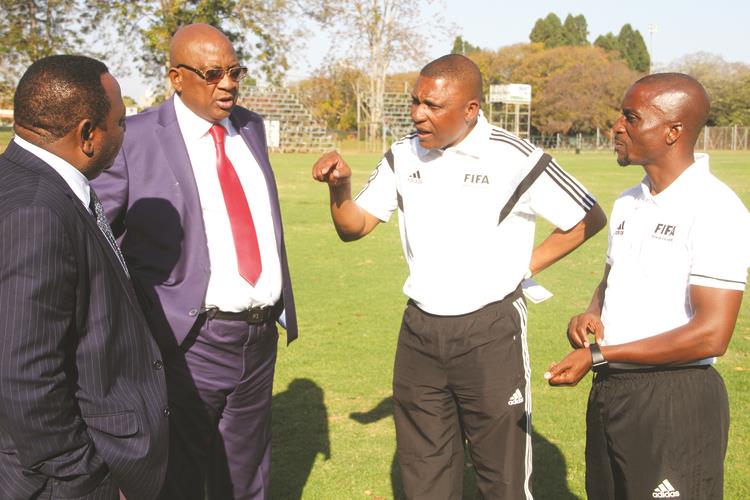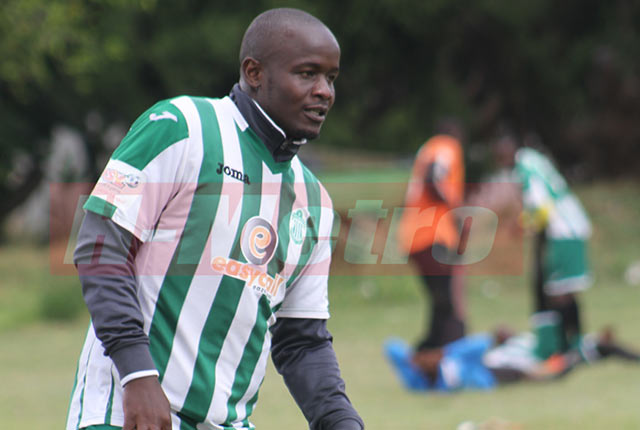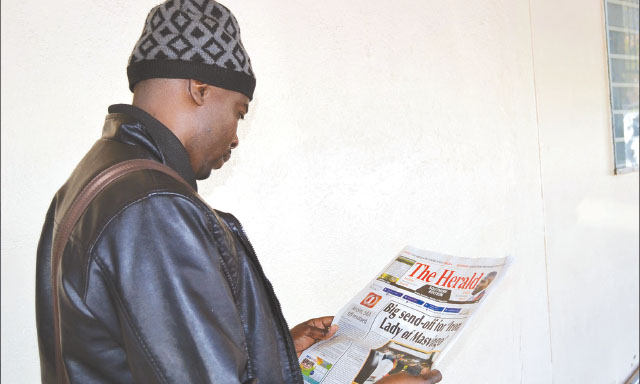Chiyangwa challenges refs


LEADERS ENCLOSURE . . . FIFA instructor Felix Tangawarima (second from right) and his colleague Mark Mzengo (right) share pointers with ZIFA president Philip Chiyangwa (second from left) and his deputy Omega Sibanda at Prince Edward yesterday
Petros Kausiyo Deputy Sports Editor
ZIFA president Philip Chiyangwa has challenged Zimbabwe’s top referees to strive to turn themselves into match officials who will be good enough to officiate at the FIFA World Cup finals. He also praised them for shunning controversies linked to match manipulation and exhibiting a degree of professionalism that has also won them some plaudits from FIFA.
The country’s top 35 match officials were back in class at Prince Edward yesterday for a week-long FIFA Member Associations course, which is being run by the world soccer governing body’s instructors Felix Tangawarima and Mark Mzengo.
Chiyangwa, who was accompanied by his deputy Omega Sibanda, officially opened the workshop and hailed the efforts being made by FIFA and the local instructors to build the capacities of local referees.
The ZIFA and COSAFA president said his association would continue to prioritise referee education among its key development pillars.
Of the 35 participants six are female, including veterans Kuda Majo, Faith Mloyi, Claris Simango and Stella Ruvinga while regular faces Norman Matemera, Nomore Musundire, Thomas Kusosa, Bongani Gadzikwa, Pilani Ncube, Salani Ncube and Pedzisayi Chadya are also in attendance.
“It is a great honour to stand before you ladies and gentlemen tasked with probably the most difficult and equally invaluable role in as far as the game of football is concerned,’’ said Chiyangwa.
“That is ensuring the equitable application of the laws of the game, in the face of ceaseless criticism from the media, players and coaches alike.
“I am not saying that as referees you are faultless, and you should be immune from criticism, but that does not in any way undermine the great value which your input adds to football.
“As an association, we prioritise referee education because you are the custodians of the laws of the game on the field of play. In that regard, referees have to be perfectly clear of what they are doing all the time to avoid inconsistent application of rules.
“The only way we can ensure that our refereeing standards are consistent with global rules is through continued education for development of referees, so that you have all the necessary information when you take charge of games.’’ The ZIFA boss also urged the referees to apply the laws of the game diligently to avoid heaping pressure on themselves and attracting criticism.
“It is of paramount importance to note that knowledge of the Laws of the Game alone is not enough, another equally important ingredient of successful officiating is the correct application of the laws. That is the only way match officials can stand apart from all other stakeholders who are not conversant with the laws of the game.
“Criticism will be always there, but when one has done the right thing, what we can only do is to continue to look for ways to make sure that even fans and media personnel are also educated on the Laws of the Game.
“Your duty as referees is enormous in the sense that you have to regulate escalating tempers on the pitch which is usually normal in every competition. That is possible if referees remain neutral players, a third team playing to achieve its own goals when the match ends, that is to engender peace and unity by ensuring fun and safety during the entirety of matches.
“The enormity of your responsibility as match officials often leads to unfair practices like match manipulation, a self-defeating habit which threatens the relevance of match officials in sport.
“I urge you all to continue the good work that you have been doing, shunning match fixing and promoting fair play. Football and other sport codes are effective social vehicles for conveyance of messages of peace and unity, and referees are there to ensure that fair play is practiced on the pitch’’.
Chiyangwa, who is also the chairman of the ZIFA Referees Committee where he is deputised by the seasoned Gladmore Muzambi, challenged the participants to aim for a FIFA call to officiate on such a big stage like the World Cup.
“ZIFA understands the risk at which you find yourselves in during some high-profile matches; it is our duty to continue to implement security measures to make your noble job safe.
“I am certain that this course will enhance the vast knowledge that you already have, meaning we can only go forward and not otherwise, in as far as refereeing in this country is concerned.
“A number of you are already officiating in CAF competitions, which is a pleasing development, but you must be always looking out for the next challenge. It is possible for a Zimbabwean match official to officiate at the World Cup. We are here to provide that platform. Thank you very much FIFA for this very wonderful course,’’ Chiyangwa said.
Tangawarima who has been traversing the length and breadth of Africa on FIFA business to build the capacities of referees on the continent, applauded local instructors for producing a class that had passed 100 percent the rigorous fitness test that preceded the opening ceremony and the remainder of the week’s classes.
Malawian Mzengo, a fitness guru, conducted the tests and certified all the participants fit to continue with the other phases of the course.
“If one fails the fitness test we immediately send them home and they will not take part in the remainder of the course,’’ Tangawarima said.
Tangawarima also outlined that FIFA had changed their approach to the courses with 80 percent of the education now being dedicated to practical sessions on the field and in the classroom.
“Referees have to embrace the new philosophies that FIFA have introduced. Internationally the referees here are doing well in view of the appointments they are getting for example just yesterday (Sunday) four referees were in Zambia for the final CHAN qualifier between Zambia and South Africa which was an important game.
“Last year we did not have this course but I am happy that the local instructors here are doing their work as there has been no sign of decline,’’ said Tangawarima.











Comments